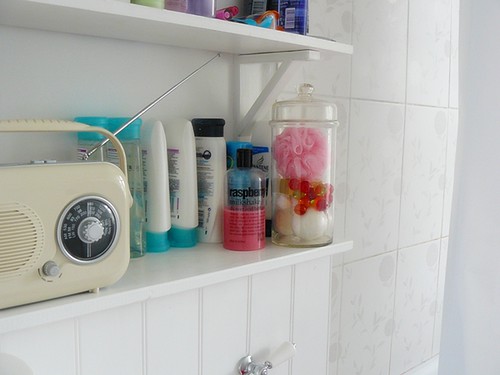Dandruff Remedy - Easy and Effective Herbal Treatments

Image : http://www.flickr.com
Dandruff, also called seborrheic dermatitis is an itchy, flaky and persistent skin disorder of the scalp, without redness. It results when the scalp sheds dead skin cells in large numbers. Dandruff appears as dry, white or greyish flakes usually on the top of the head.
It is normal to continuously shed some dead skin flakes, as the skin is constantly renewing itself. With dandruff, this whole process of skin renewal speeds up, so a greater number of dead cells get shed. In addition, the cells are shed in clumps, which are big enough to be seen with the naked eye as embarrassing flakes. The scalp may also feel slightly itchy.
Dandruff is a very common problem and 90% of the people around the world ail from it at some point in their lives. It can occur at any age, but is most likely in the early 20s. When it occurs in newborns and infants, dandruff is termed as cradle cap.
Although not dangerous, dandruff can be quite embarrassing. It causes a lack of confidence and self-esteem.
Possible causes of dandruff:
Internal causes -
o Hormonal imbalance because dandruff usually starts after puberty and is more common in men than women.
o For unknown reasons, people with some illnesses, such as Parkinson's disease, are more likely to have dandruff
o Anxiety
o Oily scalp
o Family history - hereditary
o Food allergies
o Excessive sweating
o Faulty eating habits. - fried foods, fats, sugar
External causes -
o Frequent use of strong hairsprays, gels, dyes.
o Inadequate cleansing/rinsing of scalp/ hair after shampooing
o Use of lotions that contain alcohol
Treatment of dandruff:
Dandruff is a natural process. Elimination takes time, but you can manage and control it. Treatment of dandruff is directed at fighting the skin inflammation. This is done either directly, by using cortisone-based creams and lotions (which reduce inflammation), or by reducing the yeast that builds up on scaly areas and adds to the problem.
# Keep the hair and scalp clean, to decrease the accumulation of dead cells. Wash frequently so that flakes do not build up.
# The hair should be brushed daily to improve the circulation and remove any flakiness.
# Massage the scalp daily using the fingertips and working systematically over the head. This stimulates the circulation, dislodges dirt and dandruff and helps in the hair growth.
# Avoid spicy and greasy food because it helps dandruff to increase and spread. Add more fresh and green vegetables and fruits to the diet. Have a balanced diet containing lots of vitamin A, B6, B12. Avoid intake of fried foods, sugar, chocolates and nuts.
# Strong tea and coffee, processed foods should be avoided for dandruff.
What shampoo to use to treat dandruff?
There is no official branded shampoo for dandruff. Doctors usually recommend Nizoral, a medicated shampoo available only in drug stores as an anti-dandruff shampoo. It is medically proven and the effect is long lasting.
You have to try and find out which one is successful at controlling your dandruff. Some commonly available anti-dandruff shampoos in the market are Head & Shoulders, Clinic, Pantene Pro-V etc. Use a mild shampoo.
Some myths about dandruff -
Moisturizing the hair helps control dandruff. Infact, moisturizing lotions don't do much more than smooth out scales and make patches look redder.
Switching brands of shampoo helps control shampoo. Shampoo doesn't cause dandruff.
Dandruff is due to dryness of the skin. Dandruff occurs in areas where the grease glands of the skin are most active, and the skin is not usually dry.
Changing hair care routine helps control dandruff. There is no "right" shampoo or conditioner. There isn't even a "correct" number of times to shampoo per week.
Dandruff is contagious. One cannot 'catch' dandruff from someone else, such as by using his brush or comb.
Natural home made remedies -
# Rub onion onto scalp. Onions are high in sulphur, which is essential for a healthy scalp.
# Avoid dyeing hair, unless an absolute must. We all have bacteria on our scalp, some of which are beneficial. This 'good' bacteria prevent dandruff yeast, and hair dyes reduce their numbers.
# Garlic whether eaten or applied externally is excellent for fighting dandruff.
# Apple cider vinegar (diluted with equal amount of water) when massaged onto scalp helps curb dandruff. It is a natural antiseptic.
# Lemon juice or sour curd when applied onto scalp is also useful.
# Fenugreek seeds - ground into a fine paste, applied onto scalp, and left for half an hour.
# Juice of bitter gourd when massaged with oil onto scalp relieves dandruff.
# Boil some neem leaves in 4 teacups of water. After cooling and filtering, use for washing hair.
Treatment for dandruff is not a one-time affair. Dandruff comes back, if regular care on a daily basis is not taken.
Consult a doctor if your scalp is red and itchy - or if the skin is flaky around the eyebrows, round the nose or behind the ears - because this suggests you might be having a more severe form of seborrhoeic dermatitis.
8:17 AM
|
Labels:
Dandruff,
Effective,
Herbal,
Remedy,
Treatments
|
This entry was posted on 8:17 AM
and is filed under
Dandruff
,
Effective
,
Herbal
,
Remedy
,
Treatments
.
You can follow any responses to this entry through
the RSS 2.0 feed.
You can leave a response,
or trackback from your own site.
0 comments:
Post a Comment